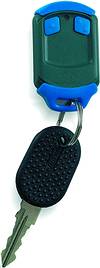

Remote controls are being used more and more to operate various devices around the home or office/factory, including entrance gates and garage door motors. In some instances alarm systems themselves are activated by remotes.
Considering that in most cases the devices referred to above are required primarily for security purposes, how secure are the remote control systems being specified with these systems?
The majority of remote controls being sold for gate and garage door automation still use a fixed coded protocol. This means every time the unit is used it transmits the same digital signal. With electronic devices such as 'code grabbers' which are now readily available, it is certainly feasible for a would-be intruder to copy this signal when an unsuspecting homeowner operates their entrance gate or garage door, allowing access at a later stage.
In a townhouse complex it is now too easy for tenants without the knowledge of the caretaker, to purchase duplicate copies of even the most advanced fixed coded remotes using the latest chameleon type products available on the market. These extra remotes can be handed unwittingly to people that should not necessarily have access to the complex.
In other instances with the binary dipswitch coding, the number of permutations available is very limited, increasing significantly the chance of another homeowner in the suburb having their remote coded the same.
South Africans are becoming more reliant on their electronic security systems. It is evident that the fixed coded remote controls are not providing the secure way to activate an entrance gate, garage door or switch an alarm. In fact, companies that profess to provide security solutions when specifying these types of remote controls are potentially putting their clients at risk. What is the use of a high wall with electric fence and automatic gate if an intruder can very easily obtain your remote control signal and gain access? What is the purpose of having a state of the art remote control activated alarm fitted if this can also be easily immobilised.
What is the solution?
Code hopping technology is neither new nor novel. But it is highly secure. The Nova range of remote controls from Centurion incorporates 'keeloq' rolling code or code-hopping technology. Every time the remote is operated, it automatically transmits a new totally randomly generated code, the result of which is that Nova cannot be duplicated or cloned, the transmitted signal cannot be copied and new transmitters can only be added to the system with access to the receiver. By fitting Nova to operate any access automation or security system guarantees an impenetrable switching device.
The fact that every leading brand of motor vehicle that uses a remote control to activate an alarm or operate the vehicle door locks has incorporated rolling code technology into their system, testifies to the fact that the electronic security industry should follow suit.
For more information contact Angie Knight, Centurion Systems, 011 699 2402, [email protected], www.centsys.co.za
© Technews Publishing (Pty) Ltd. | All Rights Reserved.